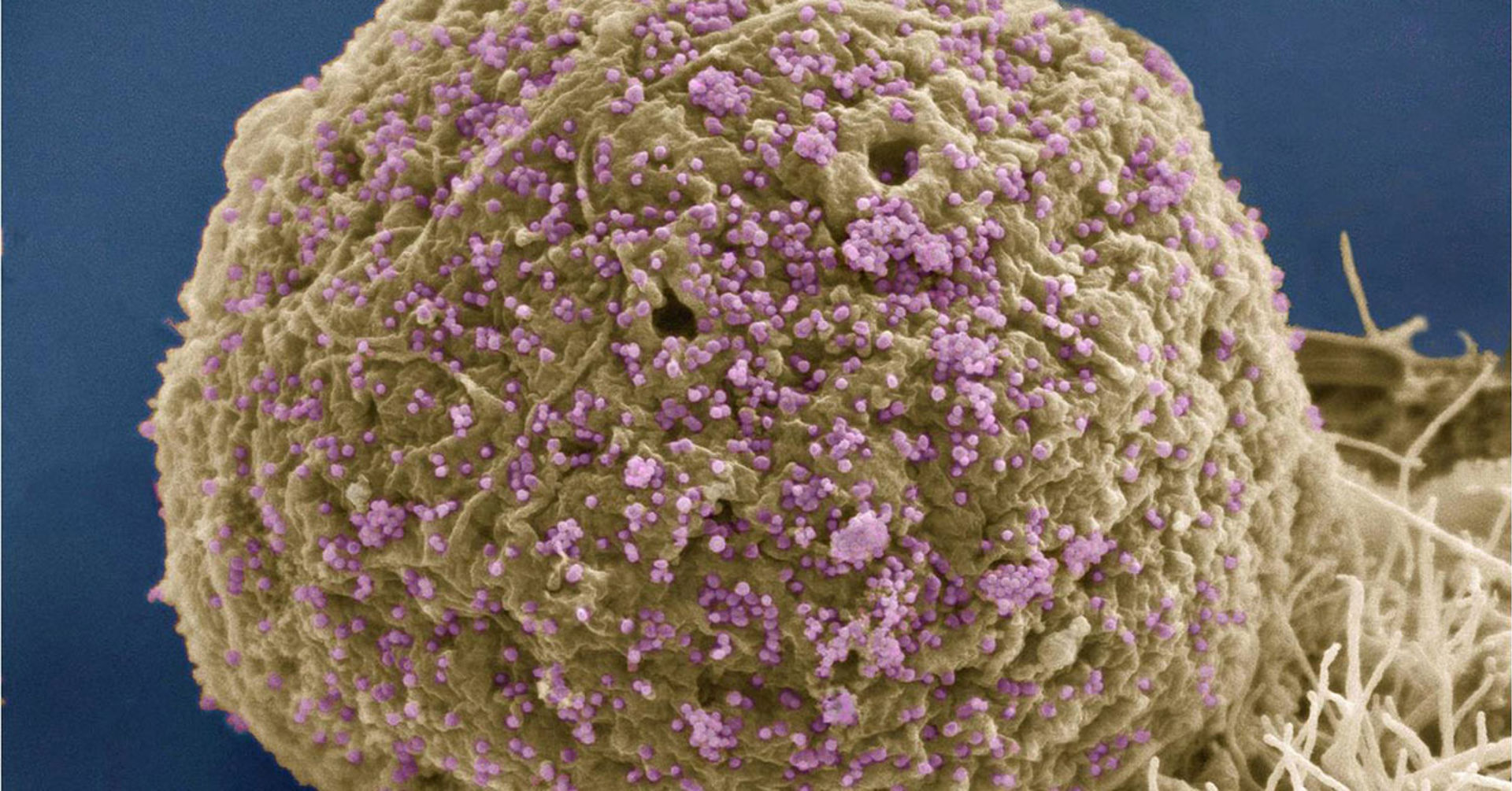
A colorized scanning electron micrograph depicts HIV particles (purple spheres) infecting a cell in the immune system. Mark Ellisman and Tom Deerinck, NCMIR, UC San Diego
The National Institute of Allergy and Infectious Diseases (NIAID), part of the National Institutes of Health, has awarded a five-year, $15.45 million grant to the San Diego Center for AIDS Research (SD CFAR) at UC San Diego, renewing support that extends back to an original establishing grant in 1994 at the height of the AIDS epidemic.
"The grant renewal represents NIAID's continued and enduring investment in our mission to be a critical regional resource in HIV research and education, to advance the discovery and development of new treatments, and ultimately to find a cure for HIV," said Davey Smith, MD, the grant's principal investigator and a co-director with Douglas Richman, MD, Distinguished Professor of Pathology and Medicine at UC San Diego School of Medicine.
Smith is also chief of the Division of Infectious Diseases and Global Public Health and professor at UC San Diego School of Medicine and an infectious specialist at UC San Diego Health. Richman also directs The HIV Institute at UC San Diego, which focuses on interdisciplinary research into HIV prevention and treatment.
SD CFAR was established by the NIAID as a regional, collaborative, frontline hub for studying HIV, bringing together multiple institutional partners, including The Scripps Research Institute, La Jolla Institute for Immunology, San Diego State University, plus local health agencies and community groups.
HIV/AIDS entered public consciousness in 1981 with the first reports of a rare, deadly infection in five young, previously healthy gay men, all living in Los Angeles. By year's end, there were 270 reported cases nationally of severe immune deficiency among gay men, with 121 deaths. The mysterious disease would get a name in 1982: acquired immune deficiency syndrome.
The next decade was marked by rapidly escalating numbers of diagnoses and deaths across the United States and globally. AIDS would afflict diverse demographic groups. In 1994, the disease would become the leading cause of death for all Americans ages 25 to 44, with the death toll reaching its all-time annual high of 48,371 in 1995.
Richman was a founding member of the SD CFAR in 1994 — and a veteran in the war against HIV/AIDS. In 1981, he had been an assistant professor operating a diagnostic virology lab at UC San Diego School of Medicine. He saw many of the first cases of HIV/AIDS.
"Those early years were hard," said Richman. "There were no treatments for HIV itself and therapies for infections that complicated AIDS were difficult and often ineffective. We were well-situated to help make a difference: the front door to the Pacific Rim, Central and South America, with a large military presence, the busiest land border crossing in the Western hemisphere and at the epicenter of one of the highest HIV burden areas."
CFAR has a four-fold mission: 1) Foster innovative HIV research through productive collaborations across fields and disciplines. 2) Leverage community engagement and international partnerships to sustain research programs locally and specifically targeted to low- and middle-income countries highly impacted by HIV, with an emphasis on health equity. 3) Train, inspire and mentor new generations of HIV investigators. 4) Plan strategically to adapt to an always-changing research environment.
At UC San Diego, SD CFAR is part of a larger coalition under the umbrella of The HIV Institute, which also encompasses the AntiViral Research Center, HIV Neurobehavioral Research Center and the Owen Clinic at UC San Diego Health, one of the nation's first clinics dedicated to treatment of HIV/AIDS patients.
"A lot has changed since HIV/AIDS first emerged," said Smith," especially in the last several years. We haven't yet found a cure, but there are now effective treatments capable of reducing AIDS to the status of a chronic but manageable condition, not unlike diabetes or hypertension. Thanks to work at places like CFAR and elsewhere, the mortality rate for AIDS is a shadow of what it once was."
"This grant's funding will help us to maintain our position as a global leader in HIV research," added Sonia Jain, PhD, professor of biostatistics at The Herbert Wertheim School of Public Health and Human Longevity Science at UC San Diego and a CFAR co-director. "It will make it possible for us to recruit and keep the most talented medical professionals and scientists, finance cutting-edge research initiatives, and give crucial support to community engagement and training."
HIV/AIDS remains a persistent plague. According to the World Health Organization, an estimated 1.5 million people worldwide acquired the disease in 2021 and 650,000 died. WHO estimates more than 38 million persons worldwide are living with HIV.
In the United States, the Centers for Disease Control estimates 1.2 million people have HIV, with roughly 13 percent unaware of their infections. Approximately 34,800 new HIV infections occurred in the U.S. in 2019. In 2020, that number decreased 17%, a decline likely due to the COVID-19 impact on prevention, testing and care-related services.
There have been significant treatment advances, such as antiretroviral drug therapy and pre-exposure prophylaxis, which is highly effective at preventing HIV infection in people at risk. But also setbacks. For example, a phase III clinical trial for a promising investigational vaccine was ended in January after researchers found the vaccine was safe but did not provide protection against HIV acquisition. Local researchers, however, remain undaunted.
"The NIAID award is a measure of the great strength of HIV research in San Diego and the willingness of scientists and medics and educators to work together toward eliminating HIV here in San Diego and globally," said Dennis Burton, PhD, professor of immunology and microbiology at The Scripps Research Institute, part of CFAR.